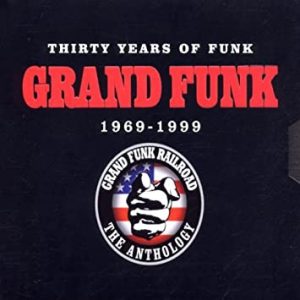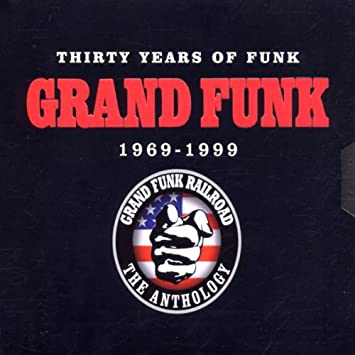 • Grand Funk Railroad: 30 Years of Funk, Capitol, 1999.
• Grand Funk Railroad: 30 Years of Funk, Capitol, 1999.
IN THEIR heyday, Grand Funk Railroad were about as big as a band could be. Record sales topped 20 million, they sold out Shea Stadium in three days (it took the Beatles seven weeks), and garage bands everywhere struggled to learn their songs. Last year, three decades after first hitting the big time, the reunited trio managed to gross more in concert revenues than either Marilyn Manson or Smashing Pumpkins.
The group’s first album, On Time, was hyped to the max when it was released in 1969. Critics savaged the band. Manager Terry Knight had dubbed his act the voice of a generation, and essentially did everything possible to alienate the then powerful underground music press, resulting in a career-long animosity between the band and critics. In spite of the bad press, sales soared.
The sound was loud and powerful, but too often workmanlike. There were a few singles (‘I’m Your Captain / Closer To Home’), but for the most part the band was an FM radio staple. While they were heartfelt, honest and never contrived, titles like ‘People Let’s Stop the War’ and ‘Mr. Limousine Driver’ evinced a remarkable lack of originality.
After a brief loss of direction following the unpleasant sacking of Knight, the group came back stronger than ever in 1973, reinvented as a top 40-friendly act. Within a year they had hit the top of the charts with ‘We’re an American Band,’ followed by a remake of ‘The Loco-Motion.’ This era brought Farner’s strongest writing, notably ‘Bad Time,’ a three-minute pop gem.
The hits subsided, but the band stuck to their guns, one of the few not to jump on the disco trend of the second half of the ’70s. The Frank Zappa-produced Good Singin’ Good Playin’ (1976) is a lost gem; it should have brought a new beginning; but without a hit single, it marked the end.
A couple of half-hearted reunions came and went, and Farner released two solo discs, continuing his politico / everyman bent with titles like ‘Ban the Man (With The Aerosol Can).’
In 1984 Farner embraced Christianity in a big way, and between 1988 and 1992 released four albums on CCM labels before leaving, due to what he perceived to be an overly casual attitude towards Christ. Speaking with BCCN in 1995, he commented on his feelings after attending a Dove Awards show: “I saw the opportunity to glorify the Lord Jesus Christ and to lift up his name,” but instead “they thanked the producers and they thanked the writers, they thanked everybody but Jesus Christ.” While he continues to speak and proclaim his Christianity in no uncertain terms, he’s never returned to the CCM market.
This triple disc anthology collects almost four hours of career highs, including the requisite rarities and unreleased tracks. A trio of unreleased tracks from Farner and drummer Don Brewer’s previous band, The Pack, show that the sound was pretty much in place from the start. Stretching through the hit years and beyond, the disc ends with three tracks recorded specifically for this album in 1996.
Last month, Farner released a rather lengthy open letter to his fans explaining that he has, for the time being anyway, left GFR. It gives his side of the recent split, but ends on an optimistic note: “As far as the future goes, I would never close the door on touring as Grand Funk Railroad again with Don and Mel, under certain parameters (if there were changes in attitudes and habits). I have expressed that very thing in letters back to Mel and Don, and in reference to our relationship, I have urged them to ‘let the healing begin.'”
Thirty years on it’s easier to judge Grand Funk on music alone. One listen to this package and it’s obvious they were far better than their rep, delivering powerful performances, first rate vocalizing and more than their share of great hooks. It’s also true that the occasional track — ‘I Can Feel Him in the Morning,’ for example — would have been better left in the can.
© John Cody 1999
